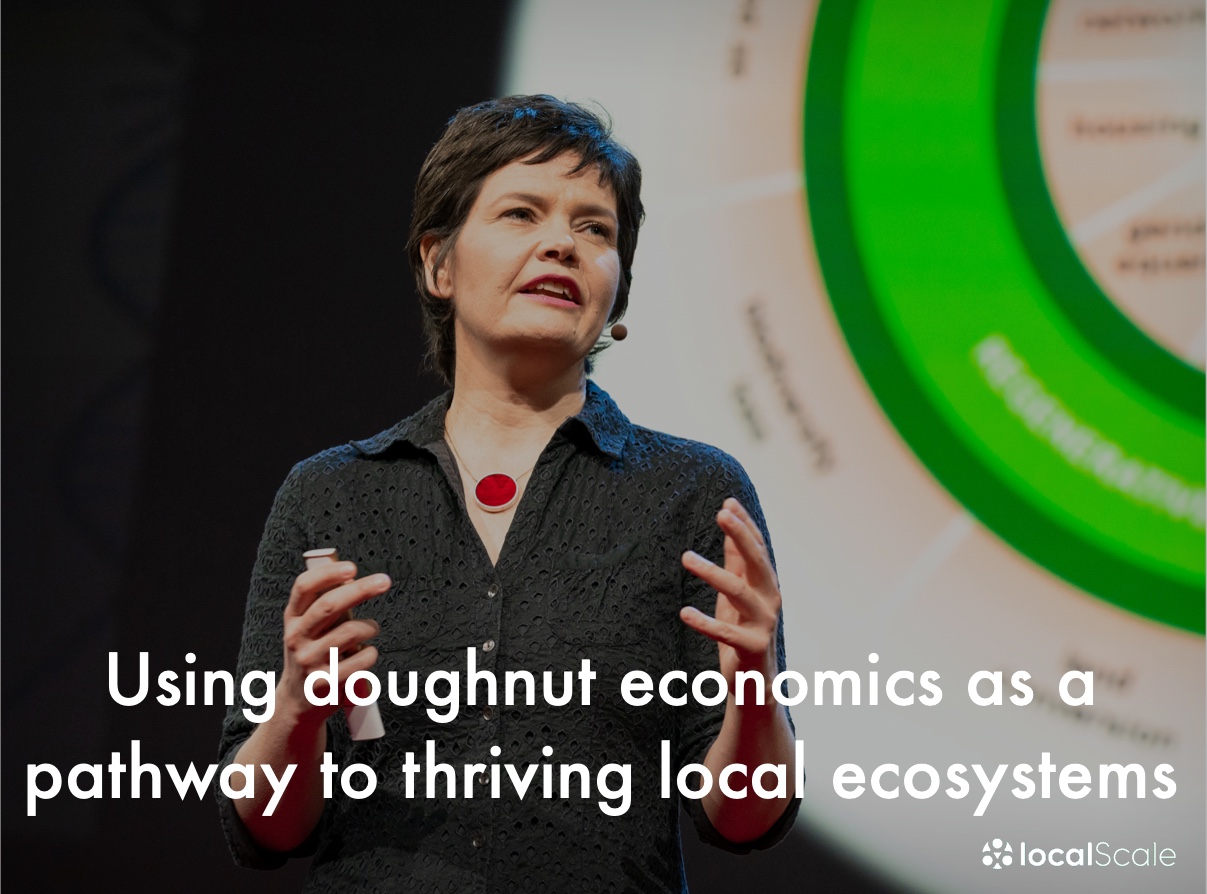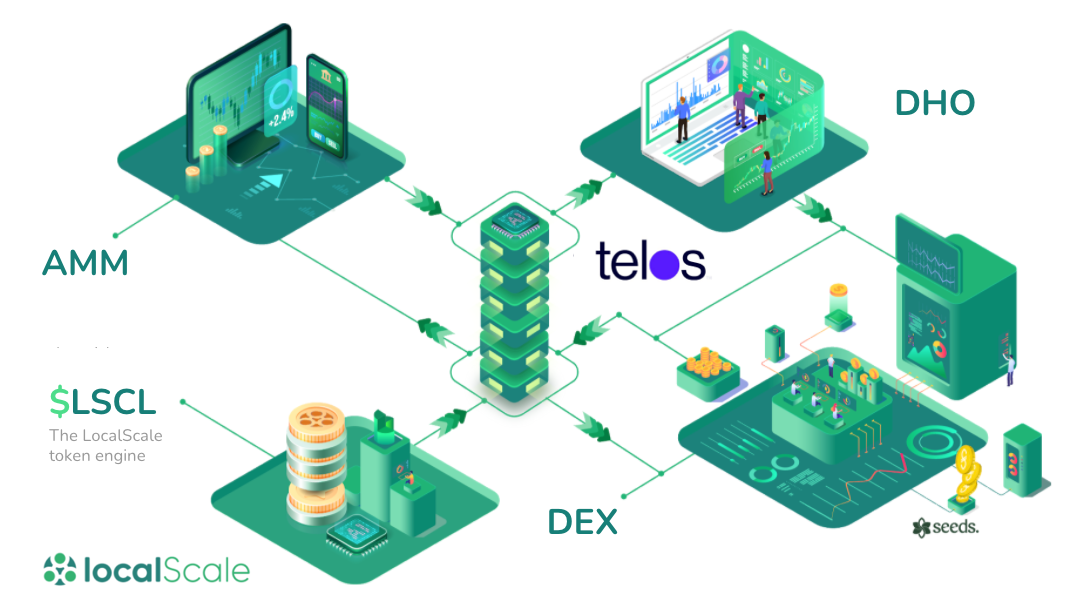Using doughnut economics as a pathway to thriving local ecosystems
- 2020-06-24 06:58:24.0
- 5905
- doughnut economics
Humans invented monetary systems to improve our health, health and wellbeing. Now, they're threatening to destroy life on our planet. But they don't have to.
Humankind needs a new vocabulary for talking about and measuring our "progress".1 We have made incredible advances over the course of our existence - yet our modern notion of human progress has been defined by economists, who measure social benefits by quantifying what boils down to exchanges between individuals. Most of these modern exchanges are made through a monetized system, fueled by money generated from natural resources and human services. This system has given many people access to the greatest luxuries our species has ever known.2 But for the past few decades, when the leaders of our society discuss "progress" and indicators to measure it, they are actually referring to the growth of monetary exchanges - which are occurring within an immature and outdated economic system. For decades now, our intellectual and political leaders have communicated with us as though "economic growth" leads to an increase in wellbeing; and that it is desirable in and of itself. Yet the growth of our current economy is fueled by the provision of goods that were once provided for through self-sufficiency, connection to vital landscapes, and communal forums held together by connection and empathy.
The economic models we have inherited take nature as a free resource that can be exploited indefinitely, and have residual senses of scarcity embedded within them: they state that humanity does not yet have enough to satisfy all its needs, so we must continue to grow, consuming all our natural resources in the process. French author and professor Jean-Marc Jancovici, also head of the think tank called the Shift Project, brilliantly demonstrated that those shortcomings in our economic theories have fatally weakened the foundations of our society, by ignoring the physical limits of our ecosystems. The crises humanity currently faces around the world are complex and overwhelming, but a common thread connecting them all is the simple fact that there are missing environmental variables in our socio-political planning equations.
Broken operating systems are undermining our symbiosis: let's upgrade
We need not assume the US dollar is THE requisite force that holds humanity as a collective being together. Money gained its power by symbolizing the value of human interactions with life, nature and each other. Thanks to our monetary-based economy's emphasis on hard work, competition and retail-based consumption, we are conditioned to forget that it is not money, but the currencies (currents of goods) that money represents that are truly valuable. We humans have the intellectual talent and design skills to restructure how all valuable currencies of life flow throughout human society. We have tapped into abundant enough resources to design a global society of wellbeing and leisure, providing a high-quality life for all. Buckminster Fuller asks from his grave: "Why aren't we using our design skills?"
We seem to have a "peter pan" financial system - one that refuses to "grow up", or evolve to acknowledge that our true goal must not be money, but optimizing exchange between humans and nature to create the highest possible level of global thriving. But we all feel that we stand on the brink of this evolution. We know we have the power to renegotiate how economic relationships transpire, and usher in a life-affirming, rather than degrading, economy.
Fixation on economic growth is an aberration, a peculiar though necessary phase that has reached its extreme and is now giving way to a new one. In nature, headlong growth and all-out competition are features of immature ecosystems, followed by complex interdependency, symbiosis, cooperation, and the cycling of resources. The next state of human economy will parallel what we are beginning to understand about nature
- Charles Eisenstein, Sacred Economics3
The proprietors of our current monetary system, government structures and the field of conventional economics would have us stand in eternal reverence of the tools and systems we have invented, but the reality is, we have the power to improve these tools. If, as mentioned above, much of what we pay for in modern times was once provided through self-sufficiency, connection to vital landscapes, and communal forums held together by connection and empathy, then what does it look like to build economies that utilize all these currencies, while applying modern technology to attain unprecedented affluence? What does it look like to untether our minds from the assumption that money is the main inherently valuable variable in our social equations, in a way that unlocks humanity's potential to live in alignment with nature, and in harmony amongst ourselves?
We all feel that we stand on the brink of this evolution. We know we have the power to renegotiate how economic relationships transpire, and usher in a life-affirming, rather than degrading, economy.
- Ferananda Ibarra4
Regenerative Economics: Conceptual Framework for the economy of a regenerative world
Enter the "Doughnut Theory" of pro-social economics, founded by Oxford Economist Kate Raworth.5 The Doughnut-shaped framework of social and planetary boundaries aids visualization of the variables we need to factor into our planning equations to build a world in which people and planet Earth can thrive in balance - in other words, it offers a compass for guiding 21st century Prosperity. As Raworth explains in the Ted Talk below, she set out to aggregate a collection of economic indicators that would refocus the minds of agents governing a society on holistic variables, that encapsulate what is important to human health and happiness, and the health of the environment on which we all depend. The resulting model ended up looking like a doughnut, and if all its principles were applied within all sectors of an economy, a society would result that works to bring humanity and nature into balance.
As of now the city of Amsterdam has committed to applying the Doughnut to their post-COVID development plan, creating a practical case study applying sure to demonstrate that this is more than "pie in the sky" theory. Raworth's team also just released a general guide to implementing the Doughnut framework at local scales. For a deeper dive, I can vouch that Doughnut Economics is a fantastically comprehensive book on the history of why we need economic reform to solve the climate crisis, as well as collectively evolve into healthier, happier societies.
Inventing the currencies of a happier, healthier world
Humanity is acquiring all the right technology for all the wrong reasons.
- Buckminster Fuller6
In our quest to re-invent the economic models that help us achieve more balanced ecosystems, we need to invent the tools that will make the model actionable. We are all aware that those in our society who understand and use tools of monetary management (DeFi, derivatives, toolkits of equity management), are the most rewarded financially and therefore the most prosperous. More and more of us are now also aware that we have tools for building new currencies, like Blockchain. Financial tools are currently being used as means to the exclusive end of wealth accumulation, usually by the few - but they could be used to power a smart economy that automatically chooses the most impactful and regenerative place to direct value. Right, Bucky? He is giving a thumbs up from the beyond.
To complement our holistic new economic theory, we have the ability to innovate alternative currency systems and re-create the monetary foundation underneath all we do. SEEDS is an example of such a community currency, which is developing a system of value allocation to regenerative initiatives. SEEDS isn't just a better way to pay. It's a solution that rewards and finances the people and organisations committed to creating a healthier and more equitable planet. Crafted from systems that reflect the latest in financial, social and political innovation, such currencies can be the web that connects and nurtures a globally regenerative culture. The broad vision of an initiative like SEEDS is an aim to become a fair system of localized, participatory governance of fund allocation processes, in which communities and organisations can invest and be invested in for their efforts to stay within their social boundaries and get the planet to thrive, doughnut-style.
Putting it all together: orchestrating and accelerating regenerative initiatives
We at LocalScale imagine a knowledge platform that could orchestrate impact-positive initiatives and accelerate the development of regenerative communities. If and when these new communities evolve, which align with regenerative principles of life and economy, they will greatly benefit from accessible tools that foster knowledge and engagement, yet where, unlike notorious social media platforms, KPIs are not hidden instruments used to optimize profits, but rather are public and used to optimize regeneration of our planet.
By leveraging academic and scientific knowledge, by connecting the people and organisations that want to implement change, by connecting the dots of innovative technologies that are making our world a better place, from building resilience in local food-systems, planting trees at scale, regenerating our soil, creating new systems of citizen-driven local democracies, allowing new ways to exchange value fairly for products and services, or providing training and education to create the jobs and entrepreneurs we need in supporting those efforts, we hope to facilitate and accelerate the implementation of regenerative projects and contribute to addressing every sections of the doughnut that require attention in every bioregion on Earth. (Below, a doughnut example with data collected for the city of Amsterdam):
Equipped with a verified conceptual model, with economic and accelerating tools to begin fixing unbalanced environmental and human ecosystems, we can start building and supporting regenerative communities in our own bioregions.
Being part of this transition should be rewarding, both to the soul and to the life quality of organisations and people who help build the future economy. These platforms would aim to reward them for doing so, allowing them to progressively liberate their lives from degenerative currency-based activity. We believe that a "sacred", regenerative financial system is one that directs resources to those who are doing the most important work for humanity. As we all know and feel, we currently have it backwards where the most important work a human can do is scarcely recognized (parenting, growing in joy and peace) while the least important work is the most rewarded (derivatives trading). We are being called to mature in our relationship with our "mother" earth, where in our past relationship we have been taking without regard, embracing her as our "lover" earth - becoming partners in a balanced, loving and generous relationship with Earth.
Footnotes
1. https://www.economist.com/briefing/2016/04/30/the-trouble-with-gdp
2. https://www.sciencedirect.com/science/article/abs/pii/S0014498311000155
3. EISENSTEIN, CHARLES. SACRED ECONOMICS: Money, Gift & Society in the Age of Transition. NORTH ATLANTIC BOOKS, 2021. Introduction, page 14.
4. Quoting Ferananda Ibarra https://money-morphosis.com/471/podcast/community/r16feranandaib/
5. https://www.kateraworth.com/doughnut/
6. Fuller, Buckminster. Critical Path. St. Martin's Press, 1981.


